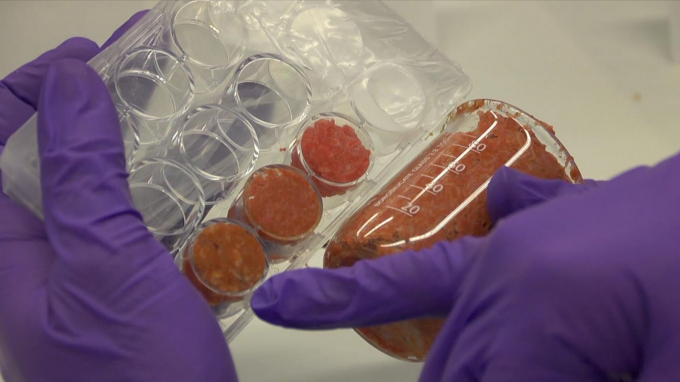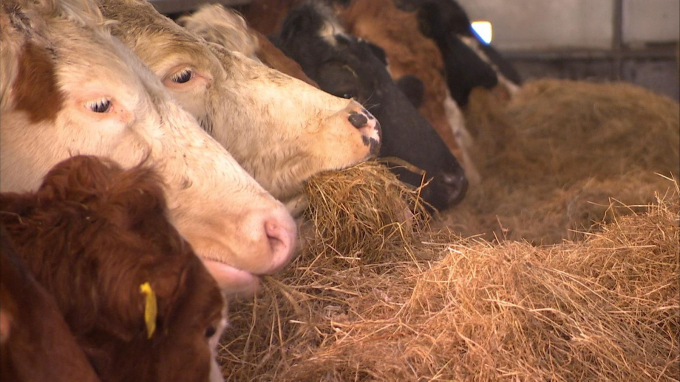June 20, 2025 | 02:00 GMT +7
June 20, 2025 | 02:00 GMT +7
Hotline: 0913.378.918
June 20, 2025 | 02:00 GMT +7
Hotline: 0913.378.918

Lab meat is created by cultivating animal cells. Photo: News Sky
A chara, – I disagree with the depiction of the cultivated meat industry in the article “Global market for ‘cultivated meat’ could reach $25 billion by 2030” (Business, February 17th) and would like to add context and justification for the product from a broader environmental, health and economic lens.
The human race has experienced multiple agricultural revolutions in the past, adopting new technologies and practices, such as the domestication of animals, selectively modifying crops and the discovery of artificial fertilisers.
These advances allowed us to create abundant food and end starvation in many regions. But unfortunately the current system has become so “efficient” at producing food it comes at a massive cost to environmental and public health.
Animal agriculture is one of the leading causes of climate change, and regardless of whether you believe it or not, it will affect you.
Animal agriculture is a calorie-negative process, meaning we feed livestock more calories than what their meat, dairy and eggs produce for us.
We are essentially throwing away food in a climate where crop failures and herd culls from drought and flooding are all too familiar.
Similarly, animal agriculture propagates antibiotic resistance, food-borne illness and zoonotic diseases (pandemics). This system is wholly unsustainable and impacts our ability to meet international greenhouse gas and climate targets.
Regardless of your opinion on climate change, disease or animal welfare, the truth is that our current protein production method cannot guarantee Irish food security going forward. Cultivated meat technology offers a solution to many of these concerns.
While the technology is still in its infancy, it presents significant benefits over traditional animal agriculture.
Extensive investment in the technology by global food conglomerates, private investors and governments shows that the protein production industry will adopt this new agricultural revolution – growing sterile meat in a food production facility without the aforementioned environmental and health implications.
The Government must strategically invest and develop a cultivated meat industry in Ireland or risk buying the product from private markets in a climate-unstable future. – Yours, etc,

Many people say they would prefer their meat to come directly from animals. Photo: News Sky
The Adam Smith Institute says moving away from an intensive meat industry would reduce greenhouse emissions by up to 96% and free up 99% of the land currently used in farming worldwide.
Lab grown meat is not yet sold to the public, but there are firms in the US who aim to have products commercially available by the end of 2018.
It is produced by cultivating cells within tissue taken from an animal - a cow for instance - and growing them in a lab into an edible meat product.
Dr Madsen Pirie, president of the Adam Smith Institute, said switching to lab-grown meat would have a huge impact.
"We can produce the same amount of meat in factories on 1% of the land it presently takes us to do it," he said.
"It's sustainable, environmentally friendly, we don't have to cut down rainforests to plant crops to feed animals if you're growing it in factories."
Mosa Meat in the Netherlands has been ramping up its research and production of lab-grown meat during the last five years.
In 2013 it revealed the world's first hamburger made from lab-grown cells.
The company's co-founder, Professor Mark Post, told Sky News consumers who are wary will overcome any fears they have.
He said: "Maybe not in the beginning because it has this 'new thing', 'tech thing', unknown safety issues that are perceived that we have to deal with through regulatory offices - but eventually everybody will easily see the benefits of this and want to eat this."
Mosa Meat is working on a commercial product for launch in 2021.
Although lab-grown meat in our supermarkets may still be a few years away, there is already a growing demand for meat- free products which look, taste, smell and even have the texture of real meat.
At the Dirty Bones restaurant in London, the B12 burger, created by plant-based food firm Moving Mountains, is proving a popular addition to the menu.
Cutting it open, it does look pink, appetising, and surprisingly meaty.
Its ingredients include oyster mushrooms, pea protein, wheat, soy, beetroot and coconut oil.
The burger is being rolled out to more than 400 pubs across the UK next week.
Food futurologist Dr Morgaine Gaye told Sky News competition to produce meat replicas is big business.
"It really is like the space race. Everybody, all the big businesses, Silicon Valley investors are trying to find the golden mystery to creating something affordable, delicious, and it's got the fat part, that's what we want, we like the fatty part and that's the most difficult thing," she said.
Many farming bodies are understandably against this potential threat to their livelihood - and there's some way to go to convincing some food lovers we spoke to.
One woman said: "I'm a conscious consumer so I'm really careful about what I eat, where I get it from, happy meat etc. I have a lot of vegan days and don't eat meat at all so this is a big deal for me so I'm very curious."
One man said meat grown in a lab is a step too far: "I wouldn't trust anything coming from a lab, I'd feel uncomfortable with it so given the choice I'd prefer not to eat meat at all."
(Irishtimes,News Sky)

(VAN) Poultry production in Poland, which has only started recovering from devastating bird flu outbreaks earlier this year, has been hit by a series of outbreaks of Newcastle disease, with the veterinary situation deteriorating rapidly.

(VAN) Extensive licensing requirements raise concerns about intellectual property theft.

(VAN) As of Friday, a salmonella outbreak linked to a California egg producer had sickened at least 79 people. Of the infected people, 21 hospitalizations were reported, U.S. health officials said.

(VAN) With the war ongoing, many Ukrainian farmers and rural farming families face limited access to their land due to mines and lack the financial resources to purchase needed agricultural inputs.

(VAN) Vikas Rambal has quietly built a $5 billion business empire in manufacturing, property and solar, and catapulted onto the Rich List.

(VAN) Available cropland now at less than five percent, according to latest geospatial assessment from FAO and UNOSAT.

(VAN) Alt Carbon has raised $12 million in a seed round as it plans to scale its carbon dioxide removal work in the South Asian nation.